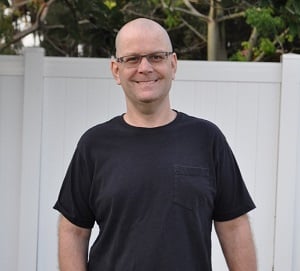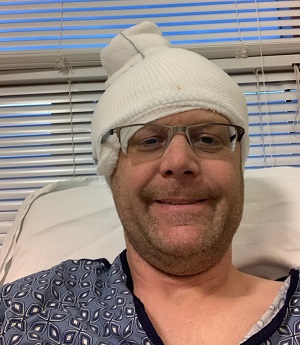“Don’t Let My Story Be Your Story”
Joe Culver has one simple message for anyone who will listen.
“Don’t let my story be your story,” the 49 year old Tampa resident said.

Moffitt patient Joe Culver
In March 2019 Culver’s life changed forever when he learned he had stage four melanoma. The cancer had metastasized to his blood, bones, several organs and his brain. It’s a fate he believes he could have avoided if he had taken the advice of friends and family 15 years ago.
“I had a spot on my shoulder,” the former restaurant manager recalled. “It would bleed, but I picked at it so I didn’t think much more about it. I had a lot of people telling me to go to the doctor but I sloughed it off and didn’t go.”
When he did finally decide to make an appointment the suspicious mole had vanished, so he never gave it another thought.
That’s uncommon, but not unheard of, according to Dr. Jane Messina, a pathologist at Moffitt Cancer Center who focuses on melanoma.
“A patient’s primary tumor can undergo regression,” Messina said. “About 15% of the time when a patient presents with a diagnosis of metastatic melanoma, the primary tumor of the skin that led to the metastasis cannot be found.”

That regression occurs when the patient’s own immune system attacks the primary tumor and causes it to completely disappear from the skin.
“But some tumor cells can escape and spread distantly,” she added.
That is likely what happened to Culver. He didn’t even think about that mole until March 2019 when he noticed a bruised and swollen area along his belt line after doing some yard work. He visited a doctor who insisted on a biopsy, which, in turn, led to the life-changing news.
“My dermatologist sent me to Moffitt and after a CT scan I learned it was stage four melanoma,” Culver said. “The next thing I knew I was scheduled for surgery two days later because I had a large tumor in my brain.”

Joe after having a large tumor removed from his brain
Moffitt doctors removed the large tumor but told him that several smaller, less threatening ones remained. He had just turned 48 years old earlier that month.
Since then, Culver has been on a number of treatments, from oral chemotherapy pills to infusion and he has accepted that this will be a battle that will likely consume the rest of his life.
But his decision to continue treatment is not about fighting cancer, he said.
“That’s such a weird word, ‘fighting,’” he said. “I’m not fighting. I’m just sitting in a chair. My life essentially turned into a bunch of check marks of what I have to do today. I have this appointment, I go here and I take my meds at this time. That’s it.”
He said palliative care was discussed, and it’s still an option. But for now he chooses to keep up with his treatment.
“I’m just not at that point yet,” he said. “I really want people to understand that this can happen to them if they aren’t careful. That’s the message I want to get out.”
Culver said he rarely wore sunblock when he went outdoors and remembers numerous, blistering sunburns as a teen and young man.
“I have a fair complexion but I was carefree and just didn’t worry about it,” Culver said. “Now I look back at what I put my friends and family through just because I didn’t get that one spot checked out 15 years ago. Maybe someone will see this and will avoid the mistakes I made.”



